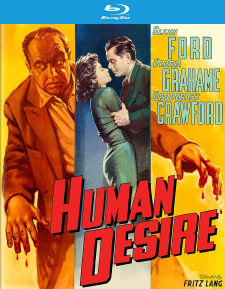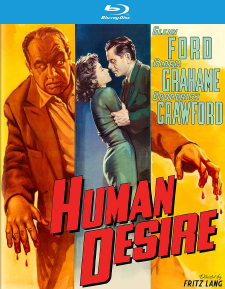Human Desire (Blu-ray Review)

Director
Fritz LangRelease Date(s)
1954 (June 11, 2023)Studio(s)
Columbia Pictures (Kino Lorber Studio Classics)- Film/Program Grade: B+
- Video Grade: A-
- Audio Grade: A-
- Extras Grade: B-
Review
Reuniting the director and stars of the noir classic The Big Heat (1953), Human Desire (1954) remakes Jean Renoir’s La Bête humaine (1938) though not as well, partly because of Production Code- and studio-demanded changes, a watering down the material. And, yet, by implication the film is remarkably tawdry on its own terms, and the three leads are excellent.
Train engineer Jeff Warren (Glenn Ford) returns home from the Korean War, welcomed back to his old job by engineering partner Alec (Edgar Buchanan), in whose home Jeff is a boarder, a member of the family—and where Alec’s young adult daughter, Ellen (Kathleen Case), has long been in love with Jeff.
Elsewhere, Carl Buckley (Broderick Crawford) is an alcoholic assistant yard manager with a much younger, attractive wife, Vicki (Gloria Grahame). He has a temper, and is fired after a trainload of produce goes bad on his watch. Desperate, he persuades Vicki to visit John Owens (Grandon Rhodes), the rich and important customer of the railroad whose shipment Buckley ruined, to use his influence to get Buckley’s job back. Vicki’s connection to Owens is unclear at the beginning of the story, but when the couple travels to another city by train to see Owens, and Vicki is gone all day on her appointment with Owens, Buckley concludes that his wife has slept with him, no matter it was for his sake she did the deed.
Furious, Buckley beats Vicki and forces her to write a letter to Owens, proposing a rendezvous in Owens’s sleeping car drawing room on the train ride back. The couple barge into Owens’s room and Buckey stabs him to death, stealing his considerable bankroll and watch, hoping authorities will suspect a robbery gone bad. Vicki, unaware though perhaps suspecting Buckley’s plans all along, wants no part of the murder, but Buckley uses her letter to keep her from going to the police, and to stay in their now-loveless marriage. Further complicating matters, Jeff catches a last-minute ride aboard the same train. Buckley persuades Vicki to flirt with Jeff in the vestibule so that he can pass through the murder car unnoticed.
At the inquest, Jeff denies seeing Vicki in the train car, and she reciprocates by embarking on a love affair with Jeff, hoping he will get her out of her trapped relationship with Buckley, whose mean-drunk personality is spiraling out of control.
Lang reportedly wanted Peter Lorre to play Buckley, but by this time Lorre was too fat and too old to be believed opposite Gloria Grahame. Part of what makes Human Desire work is that one can accept that Buckley and Vicki at one time had a loving, or at least lively marriage. Further, though Buckley drinks too much, is a sloppy drunk, is obsessively controlling and physically abusive toward Vicki, is a murderer and probably a gambling addict besides, Crawford never plays him as a mere brute. Rather, the Crawford and the screenplay portray him as an alcoholic suffering from major mental health issues, and despite everything Buckley comes off as somewhat sympathetic.
(Mild spoilers) Conversely, Jeff is no saint. A classical film noir protagonist, he starts out as a decent guy, but all too easily falls for Vicki, a married woman, and their relationship is scandalous in their tight-knit town. Vicki, who manipulates Jeff to the point where maybe she’ll be able to persuade him “get rid” of Buckley on her behalf, does so not out of greed or sadism, but self-preservation. Later in the film it’s suggested Owens molested her when she was also underage, yet she’s willing to submit to her molester one more time for her husband’s sake, his pride even, a horrible, selfless act. (When he’s initially fired she offers to return to work, but he won’t allow it.) The movie doesn’t condone her behavior, but it does realistically explain it. Ford and Grahame are almost as good as Crawford.
The screenplay by Alfred Hayes, based on Émile Zola’s 1890 novel, disappoints slightly here and there. It makes a big thing about Jeff serving in Korea, and later when Vicki suggests Jeff “doing away” with Buckley is no more difficult than killing in war, Jeff draws a moral distinction that’s very ‘50s but doesn’t really wash today. In Zola’s story and Renoir’s film version, the Jeff character was as much a powder keg of violence as Buckley; maybe earlier screenplay drafts suggested this through Jeff’s wartime experiences, but this wiped clean in the released film.
Railroad companies weren’t keen about the script’s onboard train murders and alcoholic and salacious railway employees, refusing cooperation. This may account for the film’s mishmash of locations, reportedly including El Reno, Oklahoma, Chicago, New Jersey, and even Canada. The trainyards, all long gone within 30 years, are grimily authentic but the setting remains vague, a pastiche, which oddly helps. Indeed, despite all the Production Code restrictions, by implication the movie audience easily fills in the blanks, and that so much occurs off-camera does not lesson their impact.
Kino’s Blu-ray of Human Desire presents the black-and-white film in its original theatrical aspect ratio: 1.85:1. The widescreen framing adds to the uneasy, claustrophobic scenes between Buckley and Vicki, and the sexual tensions between Vicki and Jeff. The trainyard material looks great, but interiors lack Lang’s earlier kinetics, looking more like standard blah Columbia house style set-ups. The DTS-HD Master Audio (2.0 mono) is fine, and optional English subtitles are provided on this Region-Free disc.
Extras include an interview (9:38) with actress Emily Mortimer (daughter of writer John Mortimer). I assumed it was repurposed from Eureka’s U.K. Blu-ray of 2019 but that’s not the case. In any event, Mortimer’s segment is better than one might expect as she discusses her admiration of the film largely from an actor’s perspective, which is interesting. Also included is a trailer, complete with text and narration (1:57).
Human Desire is not great film noir, but it’s awfully good, thanks to Lang’s direction and exceptional work by its three leads. Highly Recommended.
- Stuart Galbraith IV

